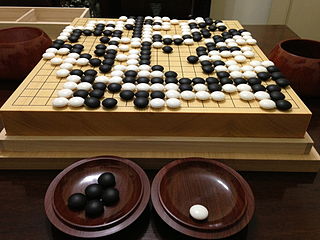Honinbo Shusaku's 185th birthday Doodle on the Google.ie homepage
Honinbo Shusaku, a Go player so skilled at the board game that he earned the nickname ‘Invincible’, has been honoured by Google with an animated Doodle on his 185th birthday.
Go is a two-player board game that originated in China more than 2,500 years ago. While the rules of the game are quite simple, opponents apply complex strategies to gain an advantage – similar to chess.
In today’s Doodle on the Google.ie homepage, an illustrated Shusaku sits at a Go board as black and white pieces are slowly added. Letters of the Google logo are also spelled out on a grid using Go pieces, or stones.
All Go
On this day in 1829, Shusaku was born Kuwabara Torajiro on the island of Innoshima in Hiroshima, Japan. Coming of age in the mid-19th century, the golden age of Go, he left home to join the Honinbo school, a prestigious institute dedicated to the game.
The name Honinbo Shusaku came in 1841 when he achieved his second diploma, or ‘dan’, and he earned the nickname ‘Invicible’ after he claimed a perfect score for 19 straight wins in the annual castle games (official matches played by representatives of the four elite Go houses of Japan in the castle of the shogun).
What is Go?
Go is an abstract strategy game played on a grid of black lines, usually 19 by 19. Game pieces in black and white, called stones, are played on the intersections of these lines.
The player with the black stones has the first move, and then opponents take turns placing stones on the vacant intersections. Once placed, stones cannot be removed unless captured by an opponent, who does so by surrounding an opposing stone or group of stones.
The object of the game is to gain the most territory on the board with your stones and there is no predetermined end point. The game only finishes when players mutually decide that no more moves of value can be made.
At this point, the territory won by each player is counted and added to captured stones and komi (additional points for the player who plays white as compensation for playing second).
The game is won by the player with the most points, but matches can also be won by resignation.
A casual game can last 20 to 90 minutes, whereas tournaments can go on for hours, with some professional-level games taking more than 16 hours.
Shusaku became one of only two people to have earned the title of ‘Go-Saint’, along with Honinbo Dosaku, and went on to become head of the Honinbo house.
When a cholera epidemic swept through Japan in 1862, Shusaku tended to those who were afflicted at Honinbo house only to fall ill himself and die from the disease on 10 August 1862 at 33 years old.

Image via zizou man/Wikimedia Commons
Leaving behind a legacy
In his short life, Shusaku had a tremendous influence on the game of Go. His legacy is honoured by the ‘Shusaku fuseki’, the name given to a method of opening the game on black, which he didn’t invent but he did perfect.
The invincible Go player is also remembered through the Shusaku number, which is used by players to measure the gap between their prowess and Shusaku’s in Go opponents.
Shusaku has also been immortalised in the manga and anime series Hikaru no Go, in which the spirit of a fictional Go player plays through him.
No D-Day Doodle
Some observers have noted today’s Doodle with surprise, as another significant anniversary is widely being marked elsewhere – particularly in the Western world. As well as Shusaku’s birthday, today is also the 70th anniversary of D-Day, the Allied invasion of Normandy and the beginning of their efforts to take back Nazi-occupied Europe.
Google – a company with the motto of ‘don’t be evil’ – prefers to stray away from sombre anniversaries such as this, though, reserving Doodles for more light-hearted topics. However, as a game based on a two-sided battle of gaining and losing territory and capturing exposed opponents, Go isn’t a million miles away from manouevres of war, and Google might just be affording a subtle nod to that turning point in World War II.